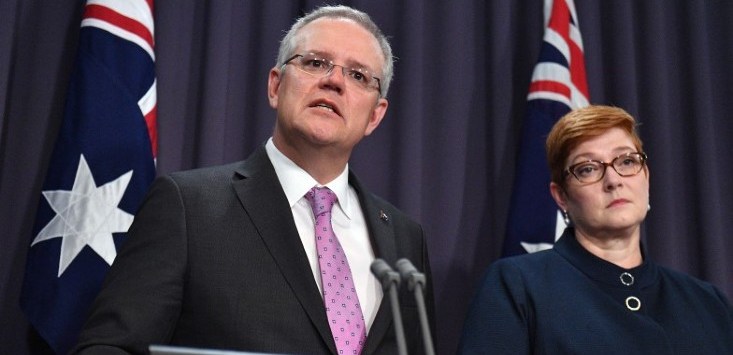
Prime Minister Scott Morrison with Minister for Women Marise Payne.
The Morrison government has outlined how it will overhaul its approach to dealing with workplace sexual harassment in its response to the Respect@Work report.
Speaking in Canberra today, Prime Minister Scott Morrison said the government would address all 55 recommendations put forward by the Sex Discrimination Commissioner Kate Jenkins in the Respect@Work report.
“All 55 recommendations are either agreed wholly, in part or in principle, or noted when they are directed to organisations other than the Australian government,” Morrison said.
The Respect@Work report, which was handed to the government in January 2020, was the result of a national inquiry established to identify ways to prevent sexual harassment in the workplace.
The 930-page report recommends Australia’s complaints-based system of handling sexual harassment complaints should be overhauled to put more responsibility on employers to provide safe workplaces.
The report recommends legislative changes to the Sex Discrimination Act and the Fair Work Act, obliging employers to eliminate sexual harassment through a positive duty, and permitting perpetrators to be fired.
It also recommendations expanding the coverage of the Sex Discrimination Act to include ministers, judges and public servants.
Other recommendations include giving community legal centres increased — and more regular — funding, more research and data-collecting initiatives, and a comprehensive educational program across schools and tertiary institutes.
Announcing the government’s response, Morrison said it was not acceptable that 39% of women and 26% of men had experienced sexual harassment in the workplace in recent times.
“It’s important that as we address these issues that we do it not in a way that sets Australians against each other,” Morrison said.
The Morrison government will table the complete Roadmap for Respect at National Cabinet on Friday, which will detail exactly how the government plans to address and assign each of the 55 recommendations.
Funding to carry out the objectives of the roadmap will be allocated in the upcoming 2021-2022 budget.
Fay Calderone, employment lawyer at Hall and Wilcox, says there was increasing pressure for the government not only to consider the report, but to act on it.
“It’s hard to say whether it’s a good outcome at this stage, until we’ve looked at the detail of what has been approved,” Calderone tells SmartCompany.
“I’m not really sure what ‘agreed in part or in principle’ means, but obviously it’s a step in the right direction.”
Calderone says one change that is certain is amending the Fair Work Act to define sexual harassment as a form of misconduct and make it a valid reason for termination.
She also supports expanding the coverage of the Sex Discrimination Act to also include MPs, judges and public servants.
“There have been some gaping holes in the Sex Discrimination Act, and it has almost been absurd that people in certain vocations were excluded from coverage and protection of the legislation,” she says.
“I think that this is a very important development,” she says.
The Morrison government has been under increasing pressure to respond to the report, which it received over one year ago, following several allegations of sexual harassment and discrimination in Parliament.
“The events around this, building over the course of the past few months, have only further highlighted and reinforced the seriousness of these issues,” Morrison said.
Just one week earlier, the Prime Minster reshuffled the Cabinet, making Social Services Minister Anne Ruston also Minister for Women’s Safety.
Morrison established a women’s cabinet taskforce, co-chaired by himself and the Minister for Women Marise Payne and gave Minister for Superannuation, Financial Services and Digital Economy, Jane Hume additional responsibilities as Minister for Women’s Economic Security.
Handpicked for you

Vic government rolls out $50,000 grants for SMEs to adopt or develop innovative tech



COMMENTS
SmartCompany is committed to hosting lively discussions. Help us keep the conversation useful, interesting and welcoming. We aim to publish comments quickly in the interest of promoting robust conversation, but we’re a small team and we deploy filters to protect against legal risk. Occasionally your comment may be held up while it is being reviewed, but we’re working as fast as we can to keep the conversation rolling.
The SmartCompany comment section is members-only content. Please subscribe to leave a comment.
The SmartCompany comment section is members-only content. Please login to leave a comment.